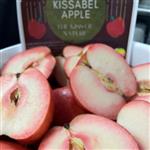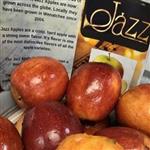- Everett Public Schools
- Fresh Fruit and Vegetable Program
Food & Nutrition Services
Page Navigation
- Overview
- Mission Statement
- Meal Prices & Payment Information
- Summer Meals
- Child Nutrition Eligibility and Education Benefit Application
- Kindergartners & New Students
- School Menus
- Special Dietary Needs
- Student Wellness Policy
- Farm to School
- Fresh Fruit and Vegetable Program
- Nutrition Information Links
- Food Safety Guidelines for Food Served in Classrooms
- Cooking from Scratch and Recipes
- Civil Rights
Fresh Fruit and Vegetable Program
-
What is the Fresh Fruit and Vegetable Program?
The Fresh Fruit and Vegetable Program (FFVP) provides all enrolled students with a variety of free fresh fruits and vegetables during the school day outside of breakfast or lunch. The goals of the FFVP are to expand the variety of fruits and vegetables children experience, increase children's fruit and vegetable consumption and make a difference in children's diets to impact their present and future health.
This unique program is currently available at just two schools; Hawthorne and Garfield Elementary schools. To participate in the program, a school must be an elementary school and have a high percentage of children eligible for free and reduced price benefits.
Schedule
The program operates Monday -Thursday except on early release days. Each classroom determines the time that works best for their classroom environment.
Taster Bites!
Many of the items that are served during the program are designed to be a taster bite to expose students to something new. A few items that have been featured include: Dragon Fruit, Star Fruit, Candy Cane Beets, Mini Cucumbers, Persimmions and so much more.
-
Below are some fruits and veggies students have tried this year
-
Star Fruit
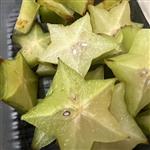
Star Fruit is rich in fiber, vitamin C and B as well as minerals like potassium. The entire fruit is edible. It has a texture like grapes and a taste that resembles a blend of pineapple, plum and lemon. Star fruit it native to Indonesia, Philippines and Malaysia. The students had an opportunity to try star fruit during October.
Persimmons
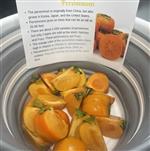
There are about 2000 varieties of persimmons but only two types are sold in stores; Hachiya and Fuyu. Students were able to taste the Fuyu variety. The orange color of the persimmon makes them high in vitamin A, C and potassium. Persimmons can be eaten dried, fresh or cooked. They are crunchy yet juicy at the same time. Persimmons originated in China but are now grown in Japan, Korea and the US.
Snow Peas
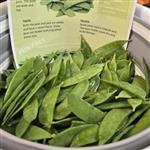
Snow peas have pale green pods and contain small, flattened peas. Both the peas and the pod are edible and have a sweet flavor. They are available year-round, the peak season for snow peas is spring through the early summer months. In the United States, snow peas are mostly grown in Washington State.
Rainbow Carrots
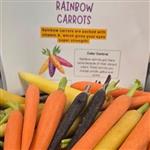
Did you know that carrots come in more colors than just orange? Students had the opportunity to try purple and yellow in addition to the traditional orange.
Watermelon Radish
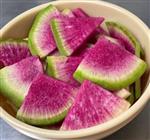
Don't let the bright color trick you; the watermelon radish is not at all sweet but rather has a mild, slightly peppery flavor. It is typically harvested during the spring and late fall.
Blackberries
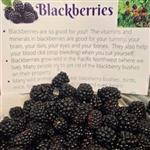
Blackberries grow wild in the Pacific Northwest. There are blackberry bushes all over the place, do you have one in your back yard?
-
Kumquats
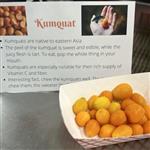
Kumquats have an edible skin which is in contrast to the tart juicy flesh inside. You can pop the whole thing in your mouth! Kumquats are native to Eastern Asia and are especially notable for their rich supply of vitamin C and fiber.
Sungold Kiwi
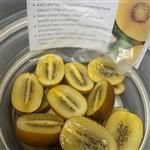
Sungold Kiwi's have a tropically sweet taste, some say a cross between a mango and a strawberry. They are softer than green kiwi's and have a smooth exterior. Sungold Kiwi's have a rare combination of both soluble and insoluble fiber and are high in vitamin C. They contain more vitamin C than an orange.
Ugli Fruit
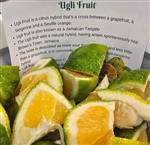
Ugli fruit is a citrus hybrid that's a cross between a grapefruit, a tangerine and a Seville orange. It is a natural hybrid, having arisen spontaneously near Brown's Town, Jamaica. The taste is described as more sour than an orange and less bitter than a grapefruit, it is commonly guessed to be a lemon-tangerine hybrid.
Red Anjou Pears
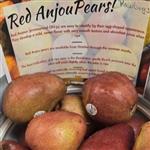
Red Anjou pears from Washington State were on the menu in February. These sweet pears were a hit with the students.
Kiwi Berries
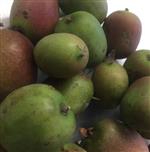
Kiwi berries are smaller and sweeter than the kiwi and do not have the hair-like fiber covering the outside so they can be eaten whole! These little treats are high in Vitamin C, fiber, antioxidants and have signigicant amounts of the minerals potassium, calcium and zinc.
-
Apples
Each week students have an opportunity to try a different type of apple. Who knew there were so many varieties and that so many of them are local! So far students have tried:
Ambrosia (Yakima, WA)
Autumn Glory (Yakima, WA)
Jazz (Washington)
Ginger Gold
Honeycrisp (Chelan, WA)
Lady Alice
Lucy Glo
Lucy Rose (Chelan, WA)
Opal (Prescott, WA)
Pink Lady (Yakima, WA)
Dragon Green
Sweet Tango
Lemonade (Washington)
Sugar Bee (Chelan, WA)
Wild Twist (Selah, WA)
Kissabel
